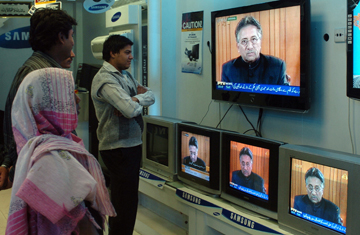
Pakistanis listen to the speech of President Pervez Musharraf being broadcast on radio and televsion, in Karachi, on Dec. 15.
President Pervez Musharraf lifted Pakistan's state of emergency Saturday, but the move was less momentous than it sounded: leading members of the judiciary remain under house arrest, restrictions on reporters are still in place, and the country is headed for an early January poll that many opposition activists and political observers fear will be rigged. Musharraf declared emergency rule six weeks ago, just as the Supreme Court was about to decide whether his election to another term as President was legal. The President, who came to power in a bloodless military coup in 1999 and finally stood down as army chief last month, arrested and sacked the most independent-minded members of the Court and has stacked it with loyalists.
Musharraf's announcement that the state of emergency was over, one day ahead of schedule, included a new rationale for why he called it in the first place. He had been forced to act, he said, because unnamed conspirators had schemed with members of the judiciary to destabilize Pakistan and upset a return to democracy. "Against my will, as a last resort, I had to impose the emergency in order to save Pakistan," he said. "The conspiracy was hatched to destabilize the country. I cannot tell how much pain the nation and I suffered due to this conspiracy."
The order to lift emergency rule should please Musharraf's Western backers, including the U.S. But many of the measures Musharraf introduced over the past six weeks remain. Draconian new regulations such as the one that curbs the freedom of the press as well as the changes to the Supreme Court "shall not be called into question by or before any court," a clause in today's order reads. Musharraf's announcement came within hours of a suicide bombing which killed five people outside an army base about 75 miles (120 km) north of the capital Islamabad. Pakistan has faced a growing insurgency from Islamist militants over the past year — a threat that the President has given as another reason behind his decision to call the emergency.
Musharraf's political opponents, who include former Prime Ministers Benazir Bhutto and Nawaz Sharif, say they will work to have the President impeached or even face treason charges. Bhutto said that the end of the emergency was an "important step forward" but that Pakistan was still a long way from true democracy. Officials in Bhutto's Pakistan People's Party warned that the upcoming elections are unlikely to be free and fair and said that government machinery is already "being exploited for foul play."
The next three weeks will be filled with electioneering and mudslinging. The poll's legitimacy will depend largely on whether the opposition parties, who pondered boycotting the election but now seem committed to taking part, see it as mostly fair or renounce it and call protest rallies. With a compromised Supreme Court and restricted media, though, many Pakistanis already believe that the poll will be little more than another fig leaf to disguise a deeply unpopular dictatorship.
